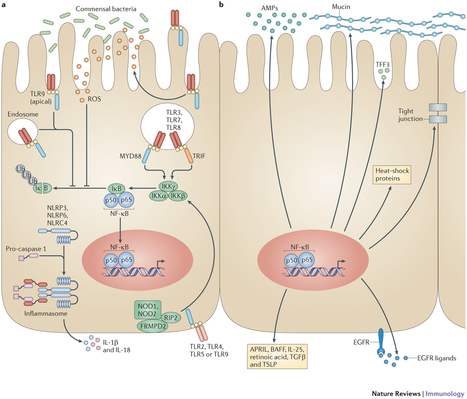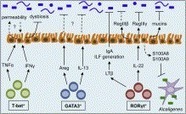Innate Lymphoid Cell Interactions with Microbiota: Implications for Intestinal Health and Disease
Gregory F. Sonnenberg1, , ,David Artis1, 2, ,
1 Department of Microbiology and Institute for Immunology, Perelman School of Medicine, University of Pennsylvania, Philadelphia, PA 19104, USA2 Department of Pathobiology, School of Veterinary Medicine, University of Pennsylvania, Philadelphia, PA 19104, USA
http://dx.doi.org/10.1016/j.immuni.2012.10.003
The mammalian intestine harbors trillions of beneficial commensal bacteria that are essential for the development of the immune system and for maintenance of physiologic processes in multiple organs. However, numerous chronic infectious, inflammatory, and metabolic diseases in humans have been associated with alterations in the composition or localization of commensal bacteria that result in dysregulated host-commensal bacteria relationships. The mammalian immune system plays an essential role in regulating the acquisition, composition, and localization of commensal bacteria in the intestine. Emerging research has implicated innate lymphoid cells (ILCs) as a critical immune cell population that orchestrates some of these host-commensal bacteria relationships that can impact immunity, inflammation, and tissue homeostasis in the intestine. This review will discuss reciprocal interactions between intestinal commensal bacteria and ILCs in the context of health and disease.

 Your new post is loading...
Your new post is loading...
 Your new post is loading...
Your new post is loading...











The abundance of innate and adaptive immune cells that reside together with trillions of beneficial commensal microorganisms in the mammalian gastrointestinal tract requires barrier and regulatory mechanisms that conserve host–microbial interactions and tissue homeostasis. This homeostasis depends on the diverse functions of intestinal epithelial cells (IECs), which include the physical segregation of commensal bacteria and the integration of microbial signals. Hence, IECs are crucial mediators of intestinal homeostasis that enable the establishment of an immunological environment permissive to colonization by commensal bacteria. In this Review, we provide a comprehensive overview of how IECs maintain host–commensal microbial relationships and immune cell homeostasis in the intestine.
Free download with registration: http://www.nature.com/nri/journal/v14/n3/pdf/nri3608.pdf